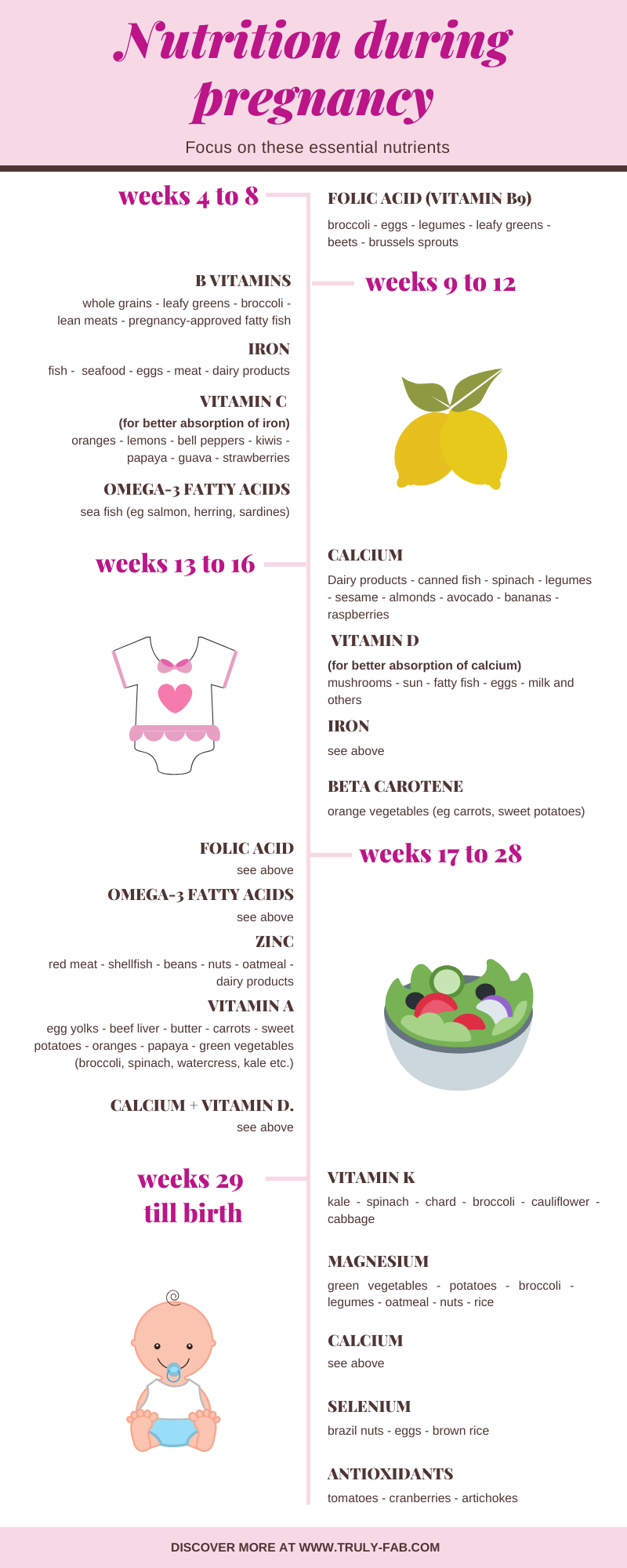To eat healthy and balanced every day is important, of course. But healthy nutrition during pregnancy is even more important. After all, you are no longer responsible just for yourself, but you must also feed your unborn child. For this reason, many pregnant women are worried: what to eat and not to eat during pregnancy to have a healthy baby?
This depends to a large extent on the developmental stage of the baby. Not all organs and body parts develop at the same time, but at different times and at different speeds. They take turns. For example, it’s the bones that need calcium, then the brain that enjoys omega-3 fatty acids.
Of course, all of this does not mean that you should only eat foods with these nutrients in these phases. The right nutrition in pregnancy should be balanced. However, so you do not have to worry anymore and can always sit down with a good feeling at the table, we have made a list of what you should avoid and what to eat during pregnancy week by week.

What you should and shouldn’t eat during pregnancy?
Everything that is healthy is allowed. If possible, choose organic foods and especially healthy fruits and vegetables. Whole grains and potatoes are just as important. The same applies to dairy products as they are important suppliers of calcium. Otherwise, you should enjoy a moderate amount of animal products. Lean meat and eggs can be consumed two or three times a week. Fish and more specifically sea fish is recommended twice a week.
Also, increase the fluid intake. 2 to 3 liters a day are perfect. You can also alternate mineral water with unsweetened herb teas. Fruit juices are also very suitable vitamin supplements, but they are best diluted (1 part juice, 2 parts water).
What not to eat and drink during pregnancy:
- undercooked eggs
- undercooked meat
- alcohol, carbonated drinks, energy drinks
- raw fish and sushi
- excessive amounts of caffeine (up to 150 mg per day is considered okay)
- certain types of cooked fish – swordfish, shark, tilefish, King mackerel
- unpasteurized anything – juice, cheese, milk, etc.

How many calories to eat while pregnant? You often hear that pregnant women now have to eat for two, but it’s not quite true. The energy requirement of pregnant women with single babies only increases by 255 to 350 kilocalories and that only from the 16th week of pregnancy. To illustrate it better that’s about 150 grams of yogurt with fruit and 3 tablespoons of cereal. Experts recommend a diet with around 2400 calories during pregnancy.
Important vitamins, minerals, and trace elements
In general, a high-protein diet is very important in pregnancy, but also carbohydrates, fats, and nutrients such as vitamins A and B, magnesium, zinc, folic acid, calcium, vitamin D, iron and iodine. While some of them are readily consumed in the amount needed by the normal diet, there is often a lack of the last 5 mentioned, extremely important substances, so pregnant women should pay particular attention to them.
See the chart below for a comparison of your normal daily intake
[table id=1 /]

How to eat healthy during pregnancy according to the developmental stage of the baby
Of course, during the entire pregnancy, you should stick to a healthy and balanced diet, exercise and lots of water. However, with the developmental stages of the fetus, you can target specific nutrients to give your baby exactly what it needs most. We summarized which nutrients are important week by week.
Nutrition for the first trimester of pregnancy
What to eat during early pregnancy – weeks 4 to 8
Experts recommend increasing the intake of folic acid before pregnancy and for the first two months after becoming pregnant. This water-soluble B vitamin can prevent neural tube defects in the baby or reduce the risk because it is important for the development of the central nervous system. Folic acid is also responsible for the formation of red and white blood cells.
600 micrograms a day are the norm for pregnant women, which is 200 micrograms more than non-pregnant women. In order to meet the needs, doctors prescribe supplements. Foods that are rich in folic acid include leafy greens (eg spinach), broccoli, eggs, and legumes.

Nutrition during pregnancy for weeks 9 to 12
B vitamins are the keyword for a healthy diet in the third month of pregnancy. With B6 you strengthen your immune system and the protein metabolism. Besides, it is important for the nervous system. Vitamin B12, in turn, contributes to the formation of red blood cells along with folic acid (which should be about 600 micrograms per day by week 12) and prevents anemia. Also, pay attention to B1 and B2 vitamin intake. Wholegrain, lettuce, broccoli, meat, and fish are major suppliers of this vitamin.
Iron is also very important during pregnancy. In combination with vitamin C, this mineral can be better absorbed by the body, which is why it is advisable to combine iron-rich foods with vitamin C-rich ones, for example, orange juice. Tea and coffee, in turn, have the opposite effect and should be avoided at least during the meal. Iron is found in sea fish and seafood, eggs, meat, and dairy products.
At the end of the first trimester, the baby’s brain begins to develop more. That’s why omega-3s are especially important now. They are mainly found in sea fish (eg mackerel and sardine). Dietary supplements can also be used if your doctor agrees.

What to eat during pregnancy in the second trimester
What to eat between weeks 13 and 16
Now the skeleton begins to develop and the still soft bones are gradually becoming solidly. The nails also form. Therefore, calcium is so important at the beginning of the third month. This can be better absorbed by the body in combination with vitamin B12. Especially mushrooms are rich in this vitamin. Also iron remains important (30 g per day), so the baby can be supplied with red blood cells.
Around the 15th week of pregnancy, the sense of sight continues to develop. To do this, the fetus needs beta carotene, which is found in oranges like carrots and sweet potatoes.

Nutrition during pregnancy from weeks 17 to 28
During the 19th week of pregnancy, the baby’s liver and spleen begin to produce white blood cells themselves. Folic acid, therefore, remains important. You should also take omega-3 fatty acids for brain development. Experts recommend eating high-fat fish twice a week.
Zinc is another nutrient that should not be lacking at this stage. It is important for the formation, proper functioning and renewal of the DNA. Legumes, whole grains, and dairy products are just a few of the zinc-containing foods that you can consume.
Vitamin A is important because it’s responsible for distinguishing Light from Darkness. As the sense of sight continues to evolve, vitamin A is of great importance. You can find plenty of vitamin A in egg yolk, milk, butter, carrots, sweet potatoes, oranges, papaya, and green vegetables.
Continue to ensure adequate calcium intake, as the baby not only needs this nutrient for bones and teeth, but also for the nerves, heart, and muscles.

What to eat during pregnancy in the third trimester
from weeks 29 until birth – roughly 7th, 8th, and 9th month
Eat foods that are high in vitamin K, as this helps blood clot. Such foods include kale, spinach, and chard. At the end of the pregnancy, the baby’s lungs also complete their development. You can help by providing them with selenium.
In addition, prepare your body for the upcoming birth and strengthen your immune system, which you also transfer to the baby at the same time. Whole grains and fish help you, but also antioxidants, which are found in cranberries, artichokes, and tomatoes.
We have summarized the mentioned nutrients for a healthy diet during pregnancy in an infographic for you to give you an overview once again.
Attention! Do not concentrate solely on the listed vitamins, minerals and trace elements. Your body still needs all the nutrients it needed before pregnancy. A balanced, healthy diet is important!
Share this Image On Your Site
What to eat during pregnancy if you are a vegetarian
If you’re a vegetarian, you can expect to be able to cover most of the nutritional needs with a vegetarian diet during pregnancy, as long as you eat well. Experts recommend three servings of dairy products per day for an adequate supply of protein. Especially the combination of milk and cereals or potatoes is highly recommended. Do not forget eggs. Twice a week you should also eat legumes.
An iron deficiency is dangerous, which is why you should pay attention to it. Since iron from plant products can not be absorbed by the body as good as from animal products, you should always combine foods with iron with vitamin C (eg a glass of orange juice), because this promotes the better absorption. Organic acids also have the same effect. Nevertheless, the doctor should watch your blood levels.
Omega-3 fatty acids are mainly found in high-fat fish. However, if you are a vegetarian, you will probably have to take supplements to meet the increased need, as it is important for the development of the brain and visual function of the baby.
Inform your doctor that you are a vegetarian!
What to eat when pregnant and vegan
In a vegan diet, meat and all other useful animal products are eliminated. Meeting the necessary daily needs is now particularly difficult due to the deficiencies. After years of vegan nutrition, vegans usually also have to deal with a deficiency of B12 vitamin, which permanently damages the baby’s nervous system. A vegan diet during pregnancy is risky for both the unborn baby and the expectant mother. Therefore, this should take place under the close supervision of a doctor. Nutrition advice is highly recommended!
Tell your doctor that you are vegan!
Sources:

